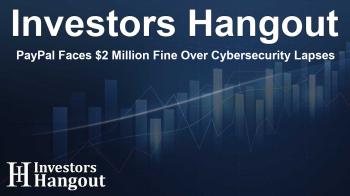PayPal Faces $2 Million Fine Over Cybersecurity Lapses

PayPal Faces a Significant Fine in New York
In a recent development, PayPal (NASDAQ: PYPL) has been ordered to pay a $2 million civil fine due to serious failures in their cybersecurity measures. This decision comes from the financial services superintendent of New York, Adrienne Harris, who made the announcement regarding this issue.
Understanding the Cybersecurity Failures
The investigation into PayPal revealed troubling shortcomings in the way the company managed its cybersecurity functions. It was discovered that the organization did not employ qualified personnel to handle critical cybersecurity tasks. This lack of experienced staff has raised concerns about their ability to protect sensitive information effectively.
Importance of Training in Cybersecurity
Additionally, the investigation highlighted that PayPal did not provide proper training to its employees to recognize and mitigate cybersecurity risks. This oversight led to a situation where essential customer data, including Social Security numbers, became vulnerable to cybercriminals.
The Impact of the Breach
As a result of these cybersecurity failures, sensitive customer information was left exposed. This is particularly concerning as it puts individuals at risk of identity theft and other cybercrimes. Cybersecurity is a critical issue in today’s digital age, and companies must prioritize this to ensure the safety of their customers.
The Path Forward for PayPal
Moving forward, PayPal will need to take decisive action to rebuild trust with its customers and regulators. Implementing improved cybersecurity training and hiring qualified personnel are essential steps that the company must take to prevent similar issues in the future.
Customer Trust and Corporate Responsibility
As one of the leading financial technology companies, PayPal has an obligation to protect sensitive customer data. This incident serves as a stark reminder of the importance of robust cybersecurity practices, not only for customer safety but also for corporate reputation.
Conclusion
This fine marks a critical moment for PayPal as it highlights the importance of maintaining robust cybersecurity protocols. As digital threats become more sophisticated, companies must remain vigilant and proactive in defending against potential breaches.
Frequently Asked Questions
What led to PayPal's $2 million fine?
PayPal was fined for serious cybersecurity failures that exposed customers' Social Security numbers.
Who announced the fine against PayPal?
The fine was announced by New York's financial services superintendent, Adrienne Harris.
What cybersecurity issues did PayPal face?
The investigation found that PayPal failed to employ qualified staff and provide adequate cybersecurity training.
How can cybersecurity failures affect customers?
Cybersecurity failures can lead to the exposure of sensitive information, increasing the risk of identity theft.
What measures will PayPal likely take after the fine?
PayPal will need to enhance its cybersecurity protocols and employee training to avoid future incidents.
About The Author
Contact Caleb Price privately here. Or send an email with ATTN: Caleb Price as the subject to contact@investorshangout.com.
About Investors Hangout
Investors Hangout is a leading online stock forum for financial discussion and learning, offering a wide range of free tools and resources. It draws in traders of all levels, who exchange market knowledge, investigate trading tactics, and keep an eye on industry developments in real time. Featuring financial articles, stock message boards, quotes, charts, company profiles, and live news updates. Through cooperative learning and a wealth of informational resources, it helps users from novices creating their first portfolios to experts honing their techniques. Join Investors Hangout today: https://investorshangout.com/
The content of this article is based on factual, publicly available information and does not represent legal, financial, or investment advice. Investors Hangout does not offer financial advice, and the author is not a licensed financial advisor. Consult a qualified advisor before making any financial or investment decisions based on this article. This article should not be considered advice to purchase, sell, or hold any securities or other investments. If any of the material provided here is inaccurate, please contact us for corrections.

